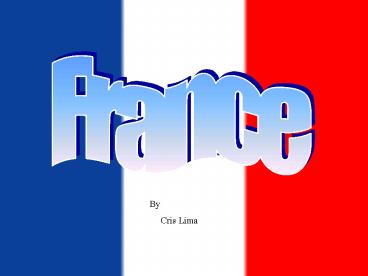France PowerPoint PPT Presentation
1 / 15
Title: France
1
France
By Cris Lima
2
History
- The Celtic tribes
- Began settlement
- Followed by Greek settlers
- Roman colony
- Settled in the region around 120 B.C.
- Named Celtic tribes and Greek settlers gauls
- In 52 B.C. Julius Caesar defeats Gallic commander
The Pont du Gard, a Roman aqueduct built in 19 BC
3
History (contd)
- The Franks
- Invaded France in 486
- Charlemagne-unifies present day France
- War erupts with England
- King Louis
- Borders established
King Louis XIV
4
The French Revolution
- The French Revolution came in 1789 when the
peasants (Frances lower class) grew tired of the
gap between the rich and the poor. Disgruntled
with their government, the lower class of France
fought for their rights until 1799 when Napoleon
Bonaparte came into power.
5
World War I and World War II
- The First World War erupted in 1914 in northeast
France
- In 1940, the Germans invaded Paris and occupied
the north and west parts of France until 1944
6
How History plays a role with an expatriate
- France has been attacked, raided, conquered,
occupied, and dominated. Centuries of fighting
against outside influence have led the French to
distrust foreigners. - An American entering the country must be aware of
Frances history, and must be sensitive to the
Frenchs suspicion of foreigners
7
Geography
- Area- 547,030 sq km
- Bordered by- Belgium, Luxemburg,
Germany,Switzerland, Italy, Monaco, Spain, and
Andorra - Mostly flat plains or gently rolling hills in
north and west remainder is mountainous - Largest West European nation
- Natural Resources- coal, iron ore, bauxite, zinc,
potash, timber, fish - 33.3 arable land
8
Population
- Religions-
- Roman Catholic 83-88, Islam 5-10, Protestant
2, Jewish 1, unaffiliated 4 - Language- 100 French
- Literacy rate-
- male 99 female 99 (1980 est.)
- Population-59,765,983
- Age structure-
- 0-14 years 18.5 15-64 years 65.2 65 years
and over 16.3 - Population growth- 0.35
- Life expectancy-
- Female 83.14 years male 75.17 years
9
Government
- Government type- Republic
- Chief of state President Jacques Chirac (since
17 May 1995) Head of government Prime Minister
Jean-Pierre Raffarin (since 7 May 2002) - 5 year terms
- prime minister nominated by the National
Assembly majority and appointed by the president
10
The Economy
- Prior to January 1, 2002 Frances currency was
the Franc. - France switched over to the Euro
- The aim of the Euro is to maintain stability and
conduct a single monetary policy in the Euro area.
11
Economy (contd)
- FRANCE
- GDP- 1.54 TRILLION
- GDP per-capita- 25,700
- France was ranked 12th in the Human Development
Reports for 1998
- UNITED STATES
- GDP- 10.082 trillion
- GDP per-capita- 36,300
- United Sates was ranked 3rd in the Human
Development Reports for 1998
12
Major industries
- Textile and clothing
- Leather products
- Wood
- Paper and printing
- Chemicals
- Petroleum products
- Rubber
- Glassware
- Soil products
- Basic metals
- Tobacco
13
US. BUSINESS ETTIQUETTE vs FRENCH BUSINESS
ETIQUETTE
14
U.S. Business Etiquette
v Be punctual. All Americans are very time
conscious. They also tend to conduct business at
a fairly fast pace. v A firm handshake and
direct eye contact are the standard
greeting. v Direct eye contact is very
important in business. Not making eye contact
implies boredom or disinterest. v Gift giving
is not common. v The United States is not
particularly rank and status conscious. Titles
are not used when addressing executives.
Americans usually like to use first names very
quickly. Informality tends to be equated with
equality. v Business meetings usually start
with a formal agenda and tasks to be
accomplished. There is usually very little small
talk. Participants are expected to express their
ideas openly disagreements are common. v
Permission should be asked before smoking. If
there is no one to introduce you in a business
meeting, you may introduce yourself and present
your card.
15
French Business Etiquette
v The French are formal and conservative in
business protocol. The French usually dress very
conservatively. This is changing somewhat but it
is best to be conservative until you discover if
your counterparts are dressing more
informally. v First names are rarely used.
Also if you do speak French, always use the
formal you (vous) and not the informal
(tu). v Plan to exchange business cards
frequently v Avoid personal questions,
politics, money, and religion. v The French
dislike using the word I and tend to shun
boasting. v The French dislike a lot of
touching. v Privacy is very important to the
French and they tend to separate business and
social life. v Introductions are formal.
Handshakes are light and quick. You are also
expected to greet everyone in the room. Shake
hands every time you meet a person. Do not use
first names until they ask you to.

